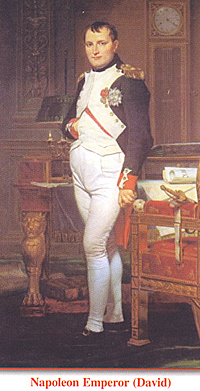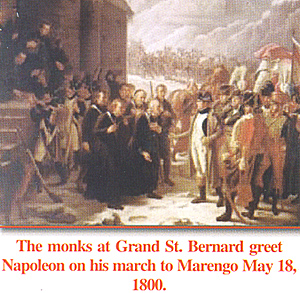Napoleon Bonaparte
Examples of Peace
by Ben Weider, CM, CQ, SBStJ, Ph.D, Canada
| |
Napoleon Emperor (David) Dec. 25, 1799 On the very day that he assumed his functions as First Consul, Bonaparte wrote to the king of England and to the Emperor of Austria imploring them “not to forego the happiness of bringing peace to the world.” England did not reply. In May, the Austrian army crossed France’s southwest border and penetrated into the Var. Bonaparte was thus obliged to leave his exhausting work as administrator and hasten to save France and the Republic. He was worn out and haggard from days and nights of constant effort. His wrinkled skin turned transparent and took on a pallid hue. Only his legendary energy kept him going. It was in these conditions that he reached the St. Bernard Pass and defeated the Austrians at Marengo on June 14, 1800.
September 30, 1800 The Mortefontaine Agreement. Since 1798, a naval war had been underway between the United States and France under the Directorate. In an attempt to re-establish peace between the two great republics, Bonaparte asked President John Adams to start negotiations. American diplomats Ellsworth, Davie and Van Murray arrived in Paris on April 2, 1800. Upon his return from Marengo, the First Consul sped up the negotiations, which had been tending to bog down, and the agreement was signed in the beautiful castle of Mortefontaine, in the Oise, 40 kilometers north of Paris. This was the beginning of two centuries of unbroken friendship between France on the United States. All thanks to Napoleon Bonaparte. January 1805 Napoleon addresses letters to all the sovereigns of Europe explaining “the advantages of peace and the stupidity of war, the stupidity of needlessly spilled blood.” December 1805 Directly after Austerlitz, Napoleon freed all prisoners of war and allowed the remnants of the Russian army to leave the battlefield in peace. He sang the praises of the Tsar and offered him his friendship with a view to establishing peace in Europe. He wrote: “My heart bleeds! May all this spilled blood, may all these misfortunes fall upon the treacherous English, who brought them about.” September 12, 1806 Prussia declared war on France and Napoleon wrote to King Friederich Wilhelm: “This war would be sacrilege. I am unshakable in my bond of allegiance to your Majesty.” June 14, 1807 The battle of Friedland -- Napoleon wanted to save the lives of numerous Russian and French soldiers, and when the two armies were already face to face, he wrote to the Tsar: “It is time that Europe lived in peace, safe from the malignant influence of England. Why this war? What is the good of killing each other when our peoples have so much esteem for each other, so many reasons to be friends?” June 26, 1807 Tiltsit - After his army was crushed at Friedland, Tsar Alexander became as mild as a lamb and was overcome with joy when Napoleon pardoned him and agreed to meet him on a raft in the middle of the Neimen. He swore eternal friendship to Napoleon, of whom he said: “I have never loved anything more than this man. The magical power of his gaze and the smile on his lips and in his eyes that comes directly from his soul, have turned me completely upside down. This great man of the century, this formidable commander, is friendly, affectionate and magnanimous. He is persuasive because he is sincere”. The Tsar’s last phrase says it all: Napoleon was sincere. He had always been sincere in his desire to achieve a lasting, universal peace. Yet he was confronted with bloody tyrants in England, Prussia and Russia. If Napoleon had lived in a time of peace, his achievements for the betterment of his people would have been called extraordinary, even superhuman, but when we consider that they were carried out in a time of incessant attack from every quarter, they belong quite simply to the realm of the supernatural. Napoleon Bonaparte Back to Table of Contents -- First Empire # 73 Back to First Empire List of Issues Back to MagWeb Master Magazine List © Copyright 2003 by First Empire. This article appears in MagWeb.com (Magazine Web) on the Internet World Wide Web. Other articles from military history and related magazines are available at http://www.magweb.com |
 There are a hundred examples of his efforts for peace; we shall cite just a few.
There are a hundred examples of his efforts for peace; we shall cite just a few.
 The monks at Grand St. Bernard greet Napoleon on his march to Marengo May 18, 1800.
The monks at Grand St. Bernard greet Napoleon on his march to Marengo May 18, 1800.